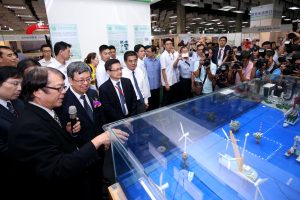As countries scramble to update the 2015 Paris climate agreement at this year’s United Nations global climate summit, Taiwan has been forced to stay home.
Kausea Natano, the prime minister of Tuvalu, spoke in support of Taiwan’s participation on Wednesday at the 25th UN Climate Change Conference (COP25). Tuvalu, a Pacific Island nation highly vulnerable to rising sea levels, is one of Taiwan’s 15 remaining diplomatic allies.
“We must open the door and allow Taiwan to become a full member of the climate change community and to participate as a party to the conferencing and the Paris Agreement,” Natano said.
This year, as it does annually, Taiwan sent a delegation of public and private sector representatives to participate in sideline events and exhibitions. But its delegation did not make it inside, where Natano told the conference it should recognize Taiwan’s contributions to addressing climate change.
Taiwan’s Ministry of Foreign Affairs tweeted protesting its exclusion from COP25 and shared a video highlighting Taiwan’s wind power ambitions. Work began on Taiwan’s Formosa 2 wind power plant in November, and the Formosa 1 plant is set to begin operations early next year after wind power companies and politicians resolved a dispute over feed-in tariffs earlier this year.
Taiwan adopted the UN Sustainable Development Goals in 2017 and passed an additional, Taiwan-specific version of them in 2018, according to the foreign ministry.
However, less than one month from Taiwan’s presidential and legislative elections, addressing climate change has not become a core plank of either major party’s platform, as President Tsai Ing-wen and her challenger, Kaohsiung Mayor Han Kuo-yu, spar over Taiwan’s relations with China.
Upon rising to power in 2016, Tsai and her Democratic Progressive Party (DPP) pledged to eliminate nuclear power by 2025 and generate at least 20 percent of energy from renewable sources. But the opposition Kuomintang (KMT), along with green energy advocates within the DPP and third parties, have consistently questioned the DPP’s ability to deliver on these promises.
In November 2018, voters rejected Tsai’s plans to abolish nuclear power by 2025 in a public referendum. In separate plebiscites, voters approved measures to stop the construction and expansion of all coal-fired power plants and to reduce production of thermal power plants by 1 percent each year.
The government had previously sought to expand a coal-fired power plant in New Taipei. It stopped the project in October 2018 in what was widely derided as a pre-election change of policy.
Taiwan Flunks a Climate Test
A report presented at COP25 on Tuesday, based on data from 2017, blasted Taiwan’s performance in combating climate change, ranking it third to last out of 58 evaluated countries – ahead of only Saudi Arabia and the United States.
The Climate Change Performance Index (CCPI), presented by Germanwatch, the NewClimate Institute and the Climate Action Network, gave Taiwan a “very low” performance rating in greenhouse gas emissions, renewable energy, and energy use.
Taiwan received a “low” rating in climate policy, which evaluates recent policy developments.
Taiwan’s greenhouse gas emissions increased in 2017 after staying relatively flat for six years, according to the report, and the country remains far from meeting its stated goal of producing 20 percent of energy from renewables. Like most countries, it is far from being on pace to meet the Paris Agreement’s objective to limit global warming to well below 2 degrees Celsius by 2030.
Taiwan’s Environmental Protection Administration (EPA) issued a response to the report on Wednesday, claiming data from Taiwan could be inaccurate as it is not part of the international organizations from which the CCPI sources its data.
One climate researcher told Taiwan’s Central News Agency that regardless of the report’s accuracy, Taiwan must commit to long-term energy transition goals to meet its targets.
But neither presidential candidate has said much about Taiwan’s energy policy – an area that can be thorny to navigate among voters.
Tsai has used COP25 to renew her calls for Taiwan to be allowed to participate in international organizations – a message that has more to do with Taiwan’s global recognition than it does Taiwan’s energy future. Han has cavorted with pro-nuclear campaigners at his rallies; the KMT has called for nuclear power in Taiwan to be maintained, if not expanded.
Several Taiwanese cities have implemented bans on plastic bags and straws, and the country has spawned a handful of promising green energy innovations.
At the national level, however, Taiwan remains far from meeting its own renewable energy goals, from hitting the targets of the Paris Agreement, and from becoming a responsible member of the global push to combat climate change through its actions.

































